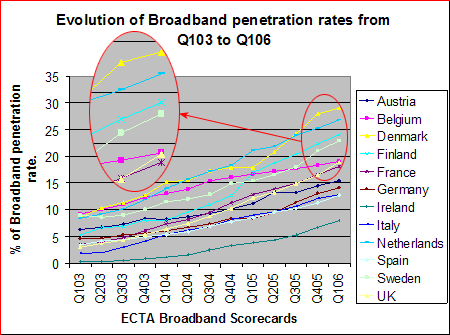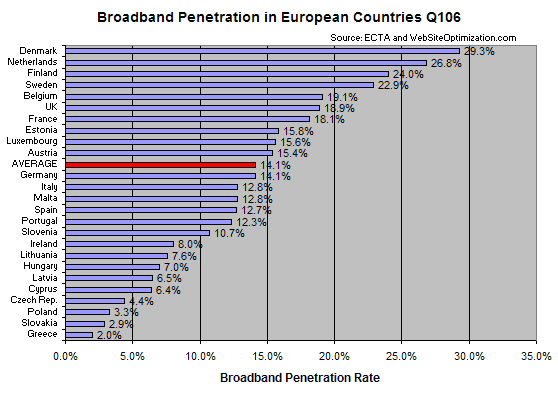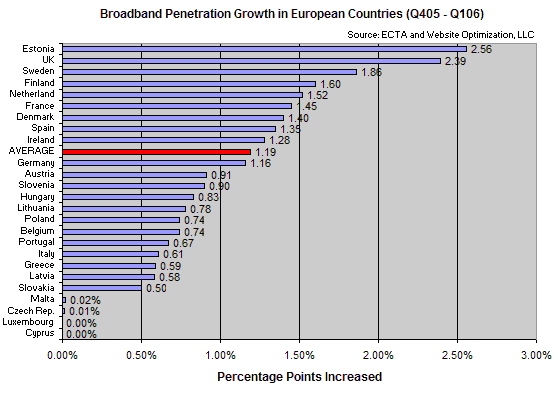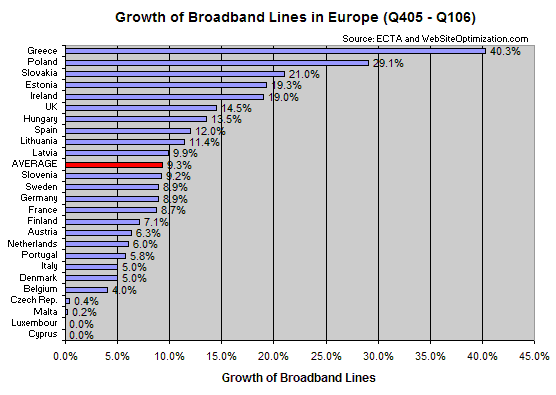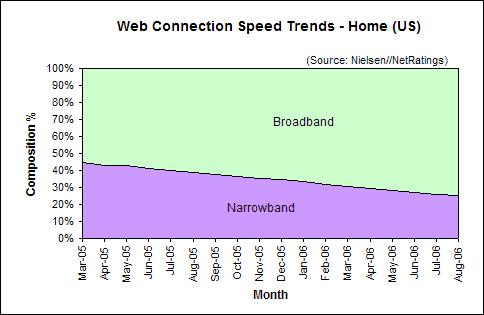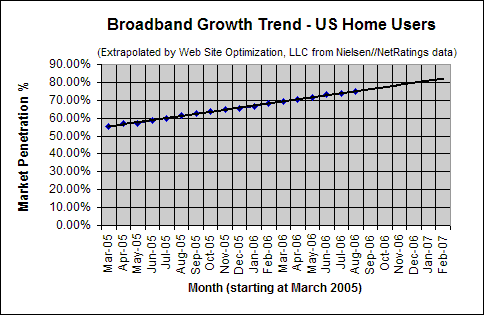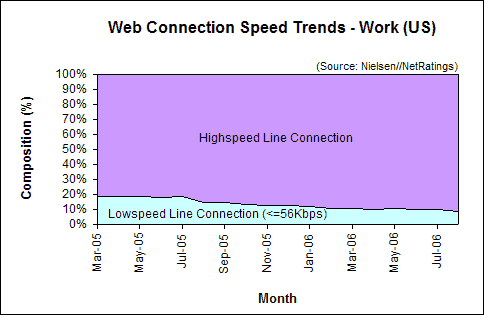Sixty-four million people now have broadband access across the 25 countries of the European Union – but the gap between the best and worst performers is widening (see Figure 1). Denmark, the Netherlands, and Finland lead the European Union in broadband penetration while Greece, Slovakia, and Poland trail according to a recent broadband survey by ECTA. Back in the US, broadband penetration among active Internet users neared 75% in August 2006.
Evolution of European Broadband Penetration Rates from Q103 to Q106
Figure 1: Evolution of European Broadband Penetration Rates from Q103 to Q106
Source: ECTA
EU Broadband Gap Widening
Denmark tops the EU with broadband penetration of 29.3% while last place Greece trails far behind at just 2% (see Figure 2). Broadband uptake in high scoring countries is growing faster than the low scoring countries, widening the gap between wired and unwired countries (see Figure 3). ECTA attributes the widening gap to regulatory action which creates more choice and competition.
Broadband Penetration Rates in European Countries – Q106
Figure 2: Broadband Penetration Rates in European Countries
Source: ECTA
Denmark tops the list at 29.3%, followed by the Netherlands at 26.8%, Finland at 24%, Sweden at 22.9%, Belgium at 19.1%, and the UK at 18.9% (see Figure 2). At its current growth rate, the UK is poised to pass Belgium in broadband penetration to become fifth among European countries surveyed (see Figure 1). Greece at 2% broadband penetration, Slovakia at 2.9%, and Poland at 3.3% trail all countries in the EU. Overall, the average broadband penetration rate of the EU is 14.1%, up 5.5 million lines over the 12.9% penetration rate of the previous quarter.
Growth in European Broadband Penetration by Country
Estonia tops the list in broadband penetration growth at 2.56 percentage points over the previous quarter, followed by the UK at 2.39, Sweden at 1.86, Finland at 1.6, the Netherlands at 1.52, and France at 1.45 (see Figure 3). France in particular was cited by ECTA for its regulatory improvement: “broadband in France was stagnating until regulatory action paved the way for competition – triple-play packages are available now for less than €30 per month.”
Broadband Penetration Growth in European Countries from Q405 to Q106
Figure 3: Broadband Penetration Growth in European Countries from Q405 to Q106 (by percentage points)
Source: ECTA
Greece, Poland, and Slovakia Lead all Countries in Broadband Line Growth Rates
Despite its last place showing, Greece leads all countries in broadband line growth at 40.3% over the past quarter (see Figure 4). Poland (29.1%), Slovakia (21%), Estonia (19.3%), Ireland (19.0%), and the UK (14.5%) follow Greece in broadband line growth. Countries with low penetration rates can quickly boost their broadband line growth, while countries with widespread broadband uptake typically experience lower growth rates as more of the population has a high-speed connection.
Growth of Broadband Lines in Europe by Country
Figure 4: European Broadband Line Growth Rates by Country
Source: ECTA
Home Connectivity in the US
US broadband penetration among active Internet users grew to 74.87% in August 2006. Narrowband users connecting at 56Kbps or less now comprise 25.13% of active Internet users, down 1.01 percentage points from 26.14% in July 2006 (see Figure 5).
Web Connection Speed Trends – Home Users (US)
Figure 5: Web Connection Speed Trends – Home Users (US)
Source: Nielsen//NetRatings
Broadband Growth Trends in the US
In August 2006, broadband penetration in US homes grew 1.01 percentage points to 74.87% up from 73.86% in July. This increase of 1.01 points is below the average increase in broadband of 1.2 points per month over the last six months (see Figure 6). At current growth rates US broadband penetration should break 80% among active Internet users by December 2006.
Broadband Adoption Growth Trend – Home Users (US)
Figure 6. Broadband Adoption Growth Trend – Home Users (US)
Extrapolated from Nielsen//NetRatings data
Work Connectivity
As of August 2006, 91.21% of US workers were on broadband, up 0.89 percentage points from the 90.32% share in July. At work 8.79% connect at 56Kbps or less (see Figure 7).
Web Connection Speed Trends – Work Users (US)
Figure 7: Web Connection Speed Trends – Work Users (US)
Source: Nielsen//NetRatings
Further Reading
- European Competitive Telecommunications Association (ECTA)
- Provided the data for EU broadband growth and penetration rates. See their Broadband Scorecard Q106 for details.
- Nielsen//NetRatings
- Provided the US broadband penetration data for active Internet users for the Bandwidth Report.

